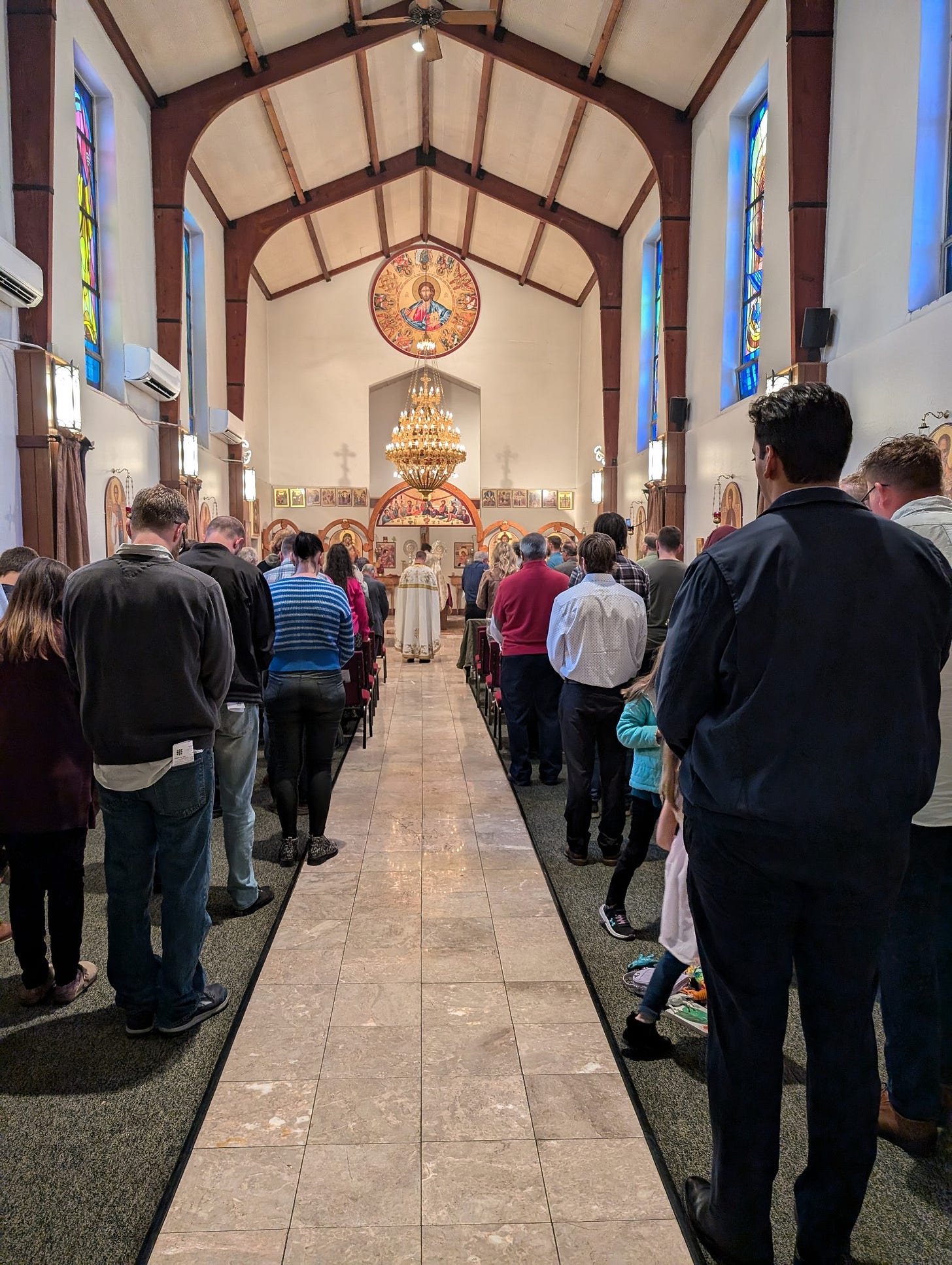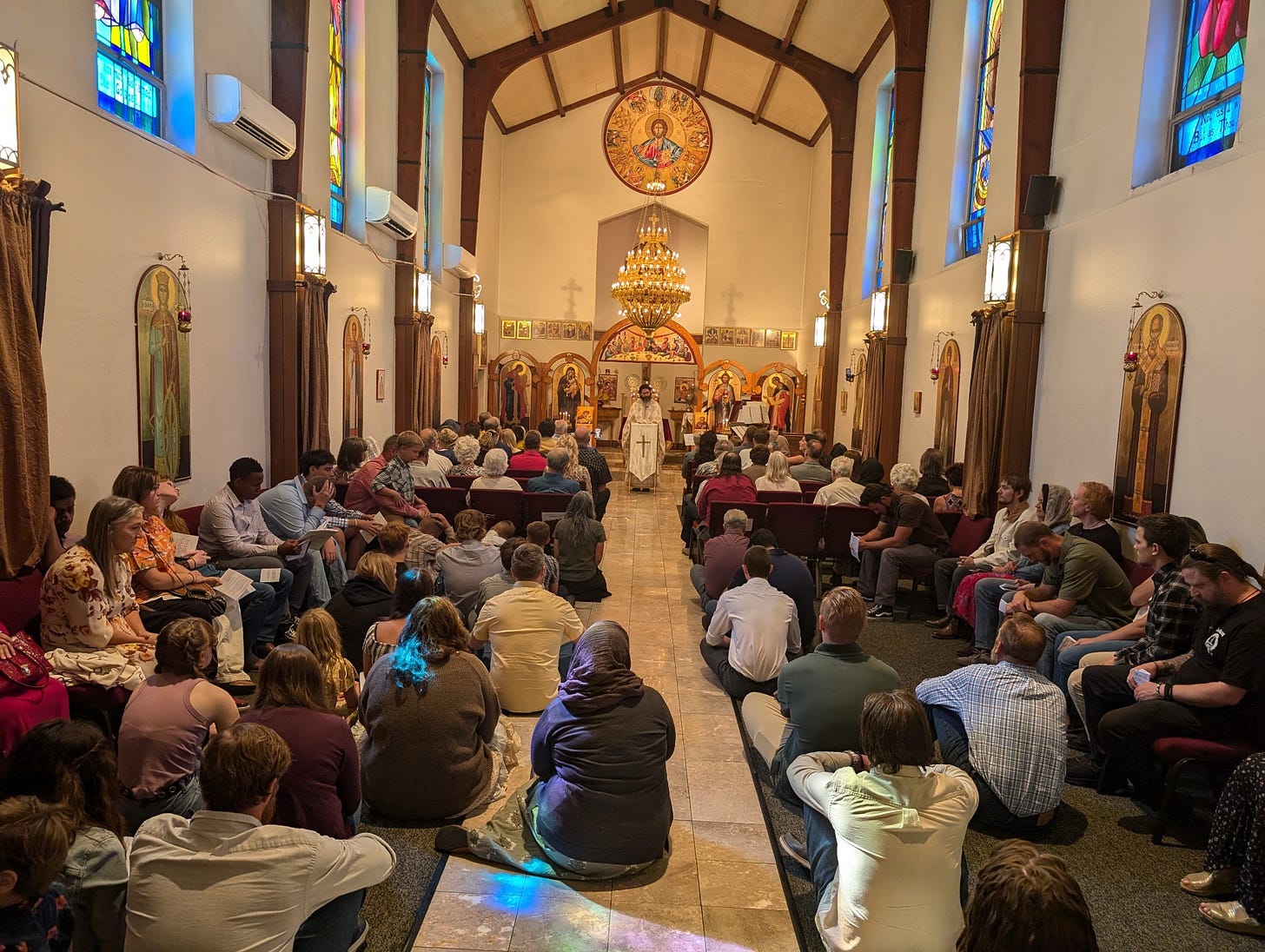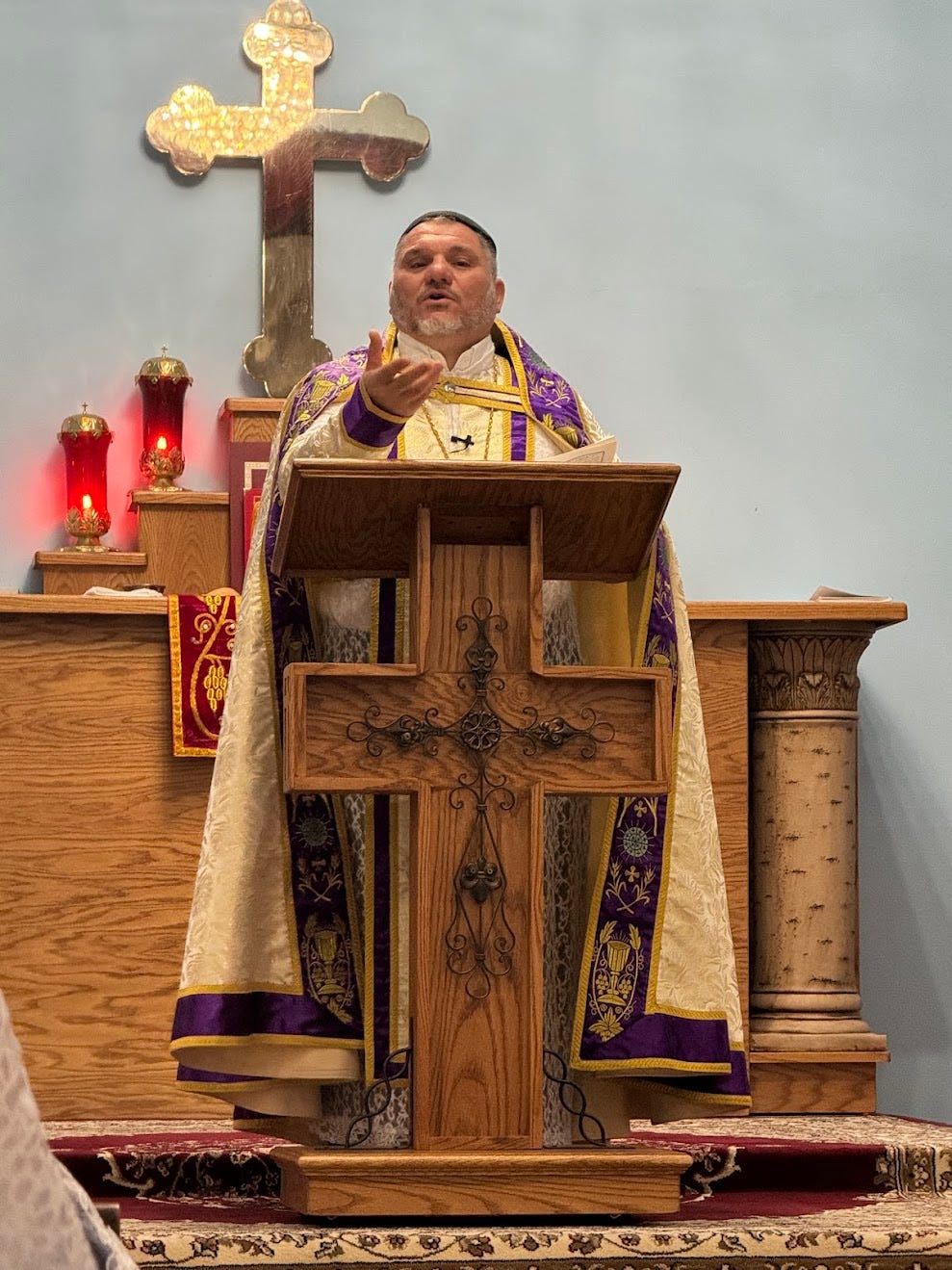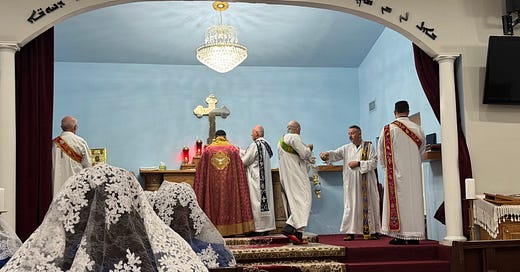Knowing Jesus vs. Knowing Tradition
Some observations after almost two years as a Syriac Orthodox believer
I live a bit of an unusual life as a Syriac Orthodox believer. Let me explain.
Most Sunday mornings, I leave my house around 9:00 am to drive to the local Greek Orthodox church, St. George Orthodox of Prescott, to attend the Divine Liturgy with my husband, who is Greek Orthodox. “With my husband" is generous. He usually will have left about 15 minutes earlier and placed my tripod stick (more on that later) on a seat in the second row from the front, left side.
So when I arrive, he will be already strategically placed in the standing-only section (about half of the church) of St. George. Strategically, because he heads up the security team at St. George. He always stays in the back to be able to have a better vantage point should anything happen from medical emergencies to gunmen entering (yes, we live in the USA).

After venerating the icons in the narthex, I kiss him quickly as I pass him by (since I won’t see him until much later in the evening) and go up to my second-row seat to get my recording equipment ready. I do all the recording in the parish (Continuing Orthodox Education between Orthros —morning prayers— and the Divine Liturgy as well as the homily) and all the parish’s social media posts. Right after the Eucharist is distributed but before the Divine Liturgy is concluded, I leave, having received a blessing from the parish priest, Father Jeffrey, in the communion line.

I then drive 1:35-1:40 hours (depending on traffic) south from the mountains where we live to the valley, to Phoenix. My Syriac Orthodox parish, St. Mary’s Syriac Orthodox Church, is in Glendale, AZ, one of the many parts of greater Phoenix. Arriving there usually about 12:45 pm, I am in time to be there for the entire Holy Qurobo, which starts right on time at 1 pm. Here, I participate in the Eucharist - taking communion with great joy.
So all this pre-story to get to the main part: my observations.
In the Greek Orthodox parish of my husband, probably a good 80%+ are converts, many from Protestant backgrounds, including the parish priest. The language is English throughout the Divine Liturgy. The parish is thriving with over 30 catechumens (those seeking to become Orthodox), mainly younger people or families. I see a vibrant community that aims to include others from outside the faith. The homily topics are always tied to the Scripture reading (mostly from the gospels). They are relevant and faith-building. Very little is about Orthodox traditions per se. Rather, the “how” of each listener’s growth in the faith is emphasized with a focus on the risen Lord Jesus.
My Syriac Orthodox parish has a very different feel to it. I love being there. I love the people. The language is Arabic and Syriac (Kthobonoyo) for the liturgy, with a few bits of English occasionally, and the homily is in Arabic. I don’t speak Arabic, and my Kthobonoyo is growing slowly but steadily thanks to the weekly lessons with Abouna Zmargdos, the priest who chrismated me. I record the homily and upload it to YouTube once I get home, so I get the benefit of the autotranslation feature and can “listen” to the homily. There is a big difference in the homilies at my parish. They are clearly for an Iraqi immigrant community with their memories of home key to understanding what is said. Often, the homilies are about saints or include other “localized” elements that don’t open up much for someone like me, who, even though having traveled quite a bit in the Middle Eastern space, has never been to Iraq.

I thought about these differences a bit more when I spoke to a few ladies in the church about the Bible lessons I have started doing for our youth. (The response has been less than encouraging.) There is clearly much genuine faith when I speak to the lovely people in our parish, but I rarely get the impression that a more educated faith exists. Coming from an academic, that probably sounds snobby. I spent much of my life studying the Bible and — more recently — the church tradition. I have two master’s degrees from seminary and a PhD to boot. And yet, I craved to study the Bible even before I ever started school in 2008. I wanted to know all there is to know. I put myself on a reading schedule to read the Bible daily and get through the Old and New Testaments in a year. I completed that for 21 years in a row (when I stopped counting). So yes, not the average Christian, even in the evangelical world. So take everything in light of that statement!
I sense that the knowledge of the saints and traditions is more pronounced than the knowledge of the pages of the Bible. When our Sayedna (our archbishop, His Eminence Mor Clemis Eugene Kaplan) visited to celebrate with us our young children’s completion of their communion education, I was embarrassed for us that they couldn’t answer simple questions from him about the Holy Eucharist they were receiving. It is not that they are not taught, but one hour on Sunday morning can't make up for a life-time learning an adult can impart on their offspring.
(Sidenote: regrettably, this also exhibits itself in a lack of missional awareness. As believers in Christ, we should desire to share our faith readily with others, but I don’t see this happening in my parish. We should be ready for visitors with translations of the liturgy and other informational material at the door. We should invite those outside of our community. We should have something more than a Facebook page so people can find us - a website that explains in Arabic and English about our parish and invites people to join us for worship!)
Yesterday, I talked with a Russian Orthodox priest who knows the Syriac Orthodox Church a bit. He is also a convert. I shared some of these thoughts with him. He told me that it is identical in the Russian Orthodox environment. Those born into the Orthodox faith are less diligent in seeking the Lord in the pages of Scripture than those from outside the faith. The same seems to be true in my husband’s parish.
So the question to me is: is the focus I want to place on Scripture evidence of a lingering remnant of my evangelical past? Or should Orthodox believers hunger for the pages of their Bibles in a similar manner?
Just yesterday, I saw the archbishop of our Eastern diocese, H. E. Mor Dionysius John Kawak, post about a recent homily in which he spoke of renewal. In it, one of the points he stressed was reading the Bible. It was not the only point, but it was clearly an important one to make.
Learning about the saints has been life-giving and precious as I entered Syriac Orthodoxy. Celebrating a liturgical church year with its feast and fast days has been equally joyful and enriching. But I have to ask our bishops and priests to continually stress the importance of reading your Bible while praying and meditating on what you read about. Growth in Christ is essential to our spiritual walk as believers in this secular world if we want to have any witness. I love my Syriac Orthodox Church, and I want it to thrive and grow!
I’ll close with a quote by Father Jeffrey from his homily on Sunday that encapsulates much of what I was trying to say:
Woe to us if we think that the main problem and driving force between loss of faith in our society is woke culture.
Woke culture is a symptom of the failure of the church to be the church.
Of the failure of the church to hear the gospel and put it into practice.








Don't give up on your love of Scripture! It's definitely not a remnant from your Evangelical past. We all need to read more Scripture and meditate on it for the health of our souls.
Ive noticed once you get deep down into the Holy tradition of the Syriac Church, it is one of the most scripture oriented traditions in the whole Church. Once you read Aphrahat or Mar Jacob of Serugh you can tell they would run circles around any evangelical! You need both the Liturgy and the Scriptures, you cannot understand the Scriptures if you do not understand the Litrugy and you cannot understand the Liturgy if you dont understand the Scriptures.